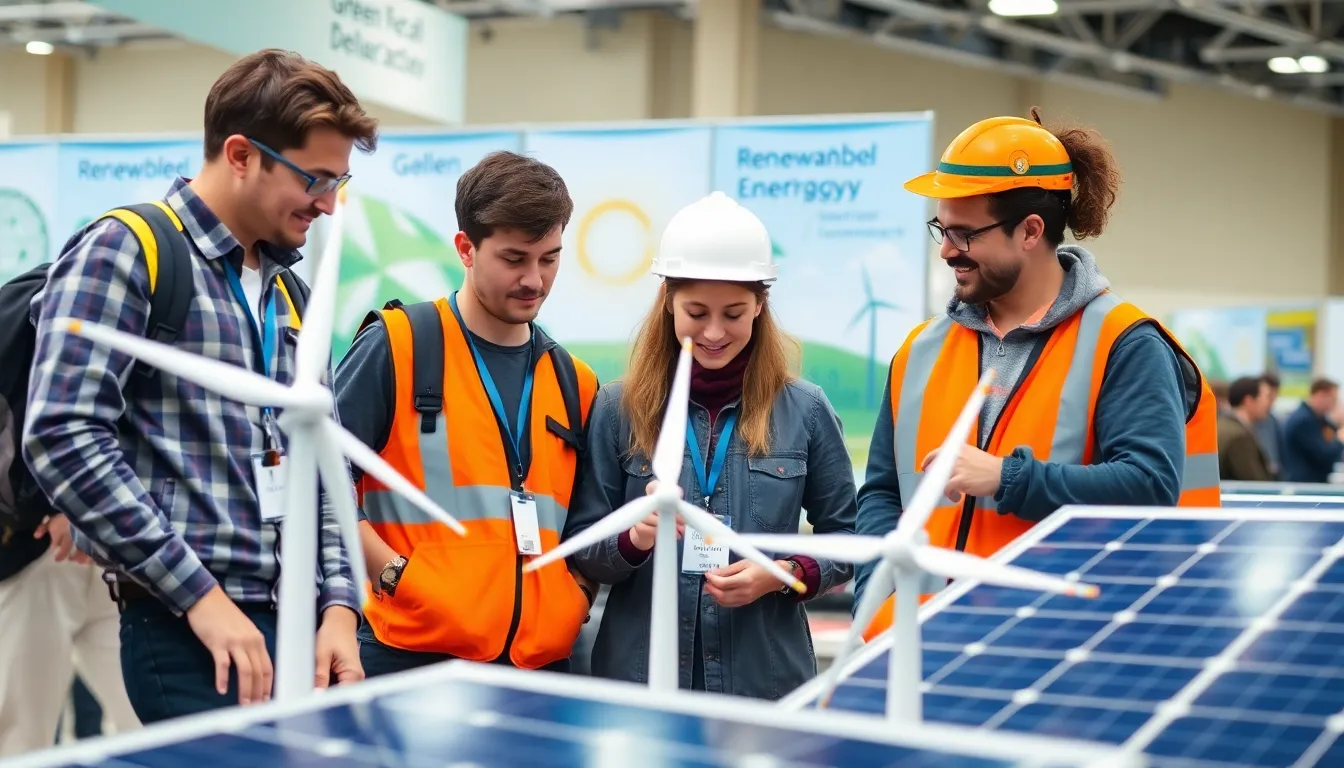In a world where climate change feels like an unwelcome guest at a party, green tech innovations are the life of the eco-friendly bash. These groundbreaking advancements not only promise to save the planet but also make it a whole lot cooler. Imagine solar panels that double as roof shingles or wind turbines that look like modern art installations. Who knew saving the Earth could be so stylish?
As technology evolves, so do our solutions to environmental challenges. From electric vehicles zipping past gas-guzzlers to smart homes that practically run themselves, the future of green tech isn’t just bright—it’s dazzling! Dive into the world of sustainable innovations and discover how these clever creations are transforming our lives while giving Mother Nature a much-needed high-five.
Table of Contents
ToggleOverview of Green Tech Innovations
Green tech innovations play a crucial role in mitigating climate change while improving daily life. Solar panels, designed to resemble traditional roof shingles, showcase how aesthetics blend with functionality. Artistic wind turbines not only harness wind energy but also enhance urban landscapes.
Electric vehicles represent a significant leap toward reducing carbon emissions, with advancements in battery technology increasing their range and efficiency. Smart homes equipped with energy-efficient appliances further contribute to sustainability by optimizing energy consumption. Innovative materials, such as biodegradable plastics, replace conventional materials that harm the environment.
Investments in renewable energy sources, such as wind, solar, and hydropower, continue to rise globally. These sources provide sustainable alternatives to fossil fuels, promising a cleaner future. Additionally, breakthroughs in energy storage solutions, like lithium-ion batteries and solid-state batteries, enhance the reliability of renewable energy systems.
Carbon capture technologies offer promising solutions to reduce greenhouse gases in the atmosphere. They capture CO2 emissions from industrial processes and transform them into usable products or store them underground. Urban farming initiatives also emerge as a response to food security issues, utilizing vertical gardens and hydroponics to maximize efficiency in limited spaces.
Together, these innovations pave the way for a sustainable future while addressing pressing environmental issues. The ongoing evolution of technology demonstrates a commitment to creating a balance between development and environmental stewardship.
Key Areas of Green Tech Innovations

Green tech innovations focus on various critical sectors that drive sustainability. These areas of advancement significantly boost eco-friendly practices and contribute to environmental protection.
Renewable Energy Solutions
Renewable energy solutions play a pivotal role in decreasing reliance on fossil fuels. Solar energy systems transform sunlight into electricity, providing clean and sustainable power. Wind energy harnesses natural wind patterns using turbines strategically located in open areas. Additionally, hydropower employs moving water to generate energy, serving as a reliable source for electricity generation. Emerging technologies like floating solar panels and offshore wind farms maximize the potential of natural resources. According to the International Renewable Energy Agency, renewable energy sources accounted for 29% of global electricity generation in 2020, and this figure continues to grow. Investments in these solutions not only reduce greenhouse gas emissions but also encourage energy independence.
Sustainable Transportation
Sustainable transportation methods contribute significantly to reducing carbon footprints. Electric vehicles (EVs) offer a cleaner alternative, emitting no tailpipe pollutants. Advancements in battery technology enhance the performance and range of EVs, making them more accessible. Public transportation options like electric buses and light rail systems reduce the number of vehicles on the road, leading to decreased traffic congestion. Car-sharing services and bike-sharing programs promote efficiency and eco-friendliness in urban settings. According to the U.S. Department of Energy, EVs could prevent over 1.5 billion metric tons of greenhouse gases from 2020 to 2040 if they achieve widespread adoption. Embracing these transportation innovations fosters sustainable urban development.
Waste Management Innovations
Innovations in waste management address the critical issue of reducing landfill waste. Recycling technologies improve the sorting and processing of materials, extending the lifecycle of products. Anaerobic digestion transforms organic waste into biogas, serving as a renewable energy source. Composting practices enhance soil health by converting biodegradable waste into natural fertilizers. Furthermore, advanced waste-to-energy systems generate power while minimizing environmental impacts. According to the Environmental Protection Agency, recycling and composting prevented the release of 186 million metric tons of carbon dioxide equivalents into the air in 2018. Adopting these waste management solutions promotes a circular economy, ensuring resources are utilized efficiently.
Benefits of Green Tech Innovations
Green tech innovations provide significant advantages across various sectors. These benefits encompass environmental enhancements and economic opportunities that contribute to a sustainable future.
Environmental Impact
Green tech innovations play a vital role in reducing carbon emissions. Technologies such as solar panels and wind turbines produce clean energy, displacing fossil fuels. Air quality sees improvement as electric vehicles replace conventional gas-powered transportation. Carbon capture solutions effectively mitigate CO2 emissions from industrial operations. Urban farming initiatives using hydroponics revolutionize food production while minimizing land use. These advancements enhance biodiversity by promoting sustainable practices in agriculture and energy generation. Together, such innovations create a positive feedback loop in addressing environmental challenges.
Economic Advantages
Green technology fosters economic growth by creating new job opportunities. Investing in renewable energy installations such as solar and wind generates thousands of positions in installation and maintenance. Energy-efficient solutions for buildings reduce utility costs, allowing for substantial savings over time. Consumers often benefit from lower energy bills resulting from smart home technologies and energy-efficient appliances. Additionally, government incentives for green tech adoption encourage businesses to innovate and expand. The rise of a green economy positions nations to compete in a sustainable global marketplace, driving investment and technological advancements that benefit society.
Challenges Facing Green Tech Innovations
Green tech innovations encounter various challenges that can hinder progress. Key obstacles include regulatory hurdles and technological limitations.
Regulatory Hurdles
Regulatory hurdles often impede the advancement of green technologies. Different regions impose varying standards, causing confusion for innovators. Complicated permitting processes can delay project timelines and increase costs. Additionally, existing regulations sometimes favor traditional energy sources over renewables, limiting competitive opportunities. Stakeholders call for clearer frameworks that simplify compliance while promoting sustainable practices. When governments align policies with environmental goals, innovation flourishes.
Technological Limitations
Technological limitations present another significant challenge for green tech. Current energy storage solutions, such as lithium-ion batteries, face capacity and longevity issues. Electric vehicles struggle with range anxiety due to insufficient charging infrastructure. Furthermore, some renewable energy sources depend heavily on weather conditions, affecting reliability. Breakthroughs in solid-state batteries offer promise, yet widespread adoption remains slow. Addressing these technological constraints is crucial for enhancing performance and fostering trust in green alternatives.
Future Trends in Green Tech Innovations
Innovations in green technology are rapidly evolving and shaping the future landscape of sustainability. Two key areas driving this progress include emerging technologies and collaborative initiatives.
Emerging Technologies
Innovative advancements, such as hydrogen fuel cells, promise to transform energy storage and transportation. Developments in solar panel efficiency continue to enhance energy capture, contributing to lower costs and higher output. Smart grids equipped with artificial intelligence optimize energy distribution, improving grid reliability. Additionally, advancements in bioengineering lead to the creation of sustainable alternatives for everyday products, reducing reliance on plastics. These technologies represent a significant shift towards a more sustainable and efficient future.
Collaborative Initiatives
Partnerships among governments, businesses, and research institutions play a crucial role in accelerating green tech innovations. Collaborative projects, such as green tech incubators, foster the development of new ideas and solutions. Joint initiatives focus on implementing sustainable practices across various sectors, uniting stakeholders in the quest for environmental improvements. Global alliances aim to share knowledge and resources, enhancing the impact of renewable technology worldwide. Such collaborations drive collective action towards achieving sustainability goals and addressing climate change challenges.
Green tech innovations are reshaping the future by providing sustainable solutions that address environmental challenges. As these technologies continue to evolve they offer both ecological and economic benefits that can lead to a healthier planet. The integration of renewable energy sources and advancements in energy storage are paving the way for a greener economy.
Despite facing challenges such as regulatory hurdles and technological limitations the commitment to innovation remains strong. Collaborative efforts among various sectors will be crucial in overcoming these obstacles. By embracing these advancements society can move towards a more sustainable future while fostering economic growth. The journey towards environmental stewardship is just beginning and the potential for positive change is immense.



